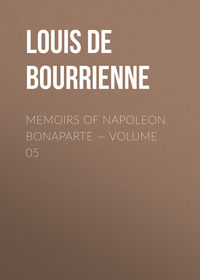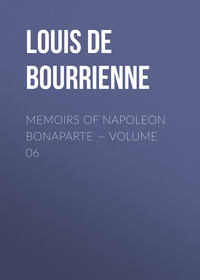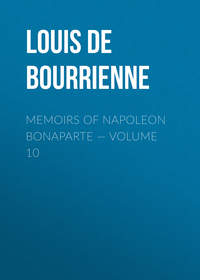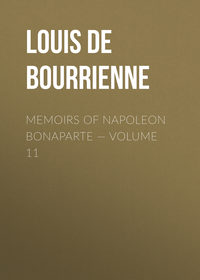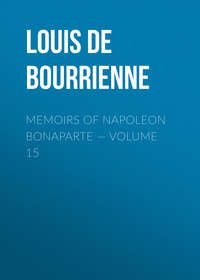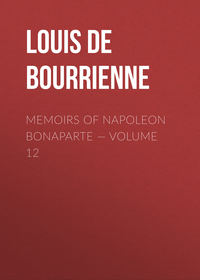 полная версия
полная версияMemoirs of Napoleon Bonaparte — Volume 08

Louis Antoine Fauvelet de Bourrienne
Memoirs of Napoleon Bonaparte — Volume 08
CHAPTER XXVII
1804.
Clavier and Hemart—Singular Proposal of Corvisart-M. Desmaisons— Project of influencing the judges—Visit to the Tuileries—Rapp in attendance—Long conversation with the Emperor—His opinion on the trial of Moreau—English assassins and Mr. Fox—Complaints against the English Government—Bonaparte and Lacuee—Affectionate behaviour—Arrest of Pichegru—Method employed by the First Consul to discover his presence in Paris—Character of Moreau—Measures of Bonaparte regarding him—Lauriston sent to the Temple—Silence respecting the Duc d'Enghien—Napoleon's opinion of Moreau and Georges—Admiration of Georges—Offers of employment and dismissal— Recital of former vexations—Audience of the Empress—Melancholy forebodings—What Bonaparte said concerning himself—Marks of kindness.
The judges composing the Tribunal which condemned Moreau were not all like Thuriot and Hemart. History has recorded an honourable contrast to the general meanness of the period in the reply given by M. Clavier, when urged by Hemart to vote for the condemnation of Moreau. "Ah, Monsieur, if we condemn him, how shall we be able to acquit ourselves?" I have, besides, the best reason for asserting that the judges were tampered with, from, a circumstance which occurred to myself.
Bonaparte knew that I was intimately connected with M. Desmaisons, one of the members of the Tribunal, and brother in-law to Corvisart; he also knew that Desmaisons was inclined to believe in Moreau's innocence, and favourable to his acquittal. During the progress of the trial Corvisart arrived at my house one morning at a very early hour, in a state of such evident embarrassment that, before he had time to utter a word, I said to him, "What is the matter? Have you heard any bad news?"
"No," replied Corvisart, "but I came by the Emperor's order. He wishes you to see my brother-in-law. 'He is,' said he to me, 'the senior judge, and a man of considerable eminence; his opinion will carry with it great weight, and I know that he is favourable to Moreau; he is in the wrong. Visit Bourrienne, said the Emperor, and concert with him respecting the best method of convincing Desmaisons of his error, for I repeat he is wrong, he is deceived.' This is the mission with which I am entrusted."
"How," said I, with thorough astonishment, "how came you to be employed in this affair? Could you believe for one moment that I would tamper with a magistrate in order to induce him to exercise an unjust rigour?"
"No, rest assured," replied Corvisart, "I merely visited you this morning in obedience to the order of the Emperor; but I knew beforehand in what manner you would regard the proposition with which I was charged. I knew your opinions and your character too well to entertain the smallest doubt in this respect, and I was convinced that I ran no risk in becoming the bearer of a commission which would be attended with no effect. Besides, had I refused to obey the Emperor, it would have proved prejudicial to your interest, and confirmed him in the opinion that you were favourable to the acquittal of Moreau. For myself," added Corvisart, "it is needless to affirm that I have no intention of attempting to influence the opinion of my brother-in-law; and if I had, you know him sufficiently well to be convinced in what light he would regard such a proceeding."
Such were the object and result of Corvisart's visit, and I am thence led to believe that similar attempts must have been made to influence other members of the Tribunal.
—["The judges had been pressed and acted on in a thousand ways by the hangerson of the Palace and especially by Real, the natural intermediary between justice and the Government. Ambition, servility, fear, every motive capable of influencing them, had been used: even their humane scruples were employed" (Lanfrey tome iii. p. 193, who goes on to say that the judges were urged to sentence Moreau to death in order that the Emperor might fully pardon him).]
But however this may be, prudence led me to discontinue visiting M. Desmaisons, with whom I was in habits of the strictest friendship.
About this period I paid a visit which occupies an important place in my recollections. On the 14th of June 1804, four days after the condemnation of Georges and his accomplices, I received a summons to attend the Emperor at St. Cloud. It was Thursday, and as I thought on the great events and tragic scenes about to be acted, I was rather uneasy respecting his intentions.
But I was fortunate enough to find my friend Rapp in waiting, who said to me as I entered, "Be not alarmed; he is in the best of humours at present, and wishes to have some conversation. with you."
Rapp then announced me to the Emperor, and I was immediately admitted to his presence. After pinching my ear and asking his usual questions, such as, "What does the world say? How are your children? What are you about? etc.," he said to me, "By the by, have you attended the proceedings against Moreau?"—" Yes, Sire, I have not been absent during one of the sittings."—" Well, Bourrienne, are you of the opinion that Moreau is innocent?"—"Yes, Sire; at least I am certain that nothing has come out in the course of the trial tending to criminate him; I am even surprised how he came to be implicated in this conspiracy, since nothing has appeared against him which has the most remote connexion with the affair."—" I know your opinion on this subject; Duroc related to me the conversation you held with him at the Tuileries; experience has shown that you were correct; but how could I act otherwise? You know that Bouvet de Lozier hanged himself in prison, and was only saved by accident. Real hurried to the Temple in order to interrogate him, and in his first confessions he criminated Moreau, affirming that he had held repeated conferences with Pichegru. Real immediately reported to me this fact, and proposed that Moreau should be arrested, since the rumours against him seemed to be well founded; he had previously made the same proposition. I at first refused my sanction to this measure; but after the charge made against him by Bouvet de Lozier, how could I act otherwise than I did? Could I suffer such open conspiracies against the Government? Could I doubt the truth of Bouvet de Lozier's declaration, under the circumstances in which it was made? Could I foresee that he would deny his first declaration when brought before the Court? There was a chain of circumstances which human sagacity could not penetrate, and I consented to the arrest of Moreau when it was proved that he was in league with Pichegru. Has not England sent assassins?"—"Sire," said I, "permit me to call to your recollection the conversation you had in my presence with Mr. Fox, after which you said to me, 'Bourrienne, I am very happy at having heard from the mouth of a man of honour that the British Government is incapable of seeking my life; I always wish to esteem my enemies."—"Bah! you are a fool! Parbleu! I did not say that the English Minister sent over an assassin, and that he said to him, 'Here is gold and a poniard; go and kill the First Consul.' No, I did not believe that; but it cannot be denied that all those foreign conspirators against my Government were serving England, and receiving pay from that power. Have I agents in London to disturb the Government of Great Britain? I have waged with it honourable warfare; I have not attempted to awaken a remembrance of the Stuarts amongst their old partisans. Is not Wright, who landed Georges and his accomplices at Dieppe, a captain in the British navy? But rest assured that, with the exception of a few babblers, whom I can easily silence, the hearts of the French people are with me; everywhere public opinion has been declared in my favour, so that I have nothing to apprehend from giving the greatest publicity to these plots, and bringing the accused to a solemn trial. The greater number of those gentlemen wished me to bring the prisoners before a military commission, that summary judgment might be obtained; but I refused my consent to this measure. It might have been said that I dreaded public opinion; and I fear it not. People may talk as much as they please, well and good, I am not obliged to hear them; but I do not like those who are attached to my person to blame what I have done."
As I could not wholly conceal an involuntary emotion, in which the Emperor saw something more than mere surprise, he paused, took me by the ear, and, smiling in the most affectionate manner, said, "I had no reference to you in what I said, but I have to complain of Lacuee. Could you believe that during the trial he went about clamouring in behalf of Moreau? He, my aide de camp—a man who owes everything to me! As for you, I have said that you acted very well in this affair."—" I know not, Sire, what has either been done or said by Lacuee,—whom I have not seen for a long time; what I said to Duroc is what history teaches in every page."—"By the by," resumed the Emperor, after a short silence, "do you know that it was I myself who discovered that Pichegru was in Paris. Everyone said to me, Pichegru is in Paris; Fouche, Real, harped on the same string, but could give me no proof of their assertion. 'What a fool you are,' said I to Real, when in an instant you may ascertain the fact. Pichegru has a brother, an aged ecclesiastic, who resides in Paris; let his dwelling be searched, and should he be absent, it will warrant a suspicion that Pichegru is here; if, on the contrary, his brother should be at home, let him be arrested: he is a simple-minded man, and in the first moments of agitation will betray the truth. Everything happened as I had foreseen, for no sooner was he arrested than, without waiting to be questioned, he inquired if it was a crime to have received his brother into his house. Thus every doubt was removed, and a miscreant in the house in which Pichegru lodged betrayed him to the police. What horrid degradation to betray a friend for the sake of gold."
Then reverting to Moreau, the Emperor talked a great deal respecting that general. "Moreau," he said, "possesses many good qualities; his bravery is undoubted; but he has more courage than energy; he is indolent and effeminate. When with the army he lived like a pasha; he smoked, was almost constantly in bed, and gave himself up to the pleasures of the table. His dispositions are naturally good; but he is too indolent for study; he does not read, and since he has been tied to his wife's apronstrings is fit for nothing. He sees only with the eyes of his wife and her mother, who have had a hand in all these late plots; and then, Bourrienne, is it not very strange that it was by my advice that he entered into this union? I was told that Mademoiselle Hulot was a creole, and I believed that he would find in her a second Josephine; how greatly was I mistaken! It is these women who have estranged us from each other, and I regret that he should have acted so unworthily. You must remember my observing to you more than two years ago that Moreau would one day run his head against the gate of the Tuileries; that he has done so was no fault of mine, for you know how much I did to secure his attachment. You cannot have forgotten the reception I gave him at Malmaison. On the 18th Brumaire I conferred on him the charge of the Luxembourg, and in that situation he fully justified my, choice. But since that period he has behaved towards me with the utmost ingratitude —entered into all the silly cabala against me, blamed all my measures, and turned into ridicule the Legion of Honour. Have not some of the intriguers put it into his head that I regard him with jealousy? You must be aware of that. You must also know as well as I how anxious the members of the Directory were to exalt the reputation of Moreau. Alarmed at my success in Italy, they wished to have in the armies a general to serve as a counterpoise to my renown. I have ascended the throne and he is the inmate of a prison! You are aware of the incessant clamouring raised against me by the whole family, at which I confess I was very much displeased; coming from those whom I had treated so well! Had he attached himself to me, I would doubtless have conferred on him the title of First Marshal of the Empire; but what could I do? He constantly depreciated my campaigns and my government. From discontent to revolt there is frequently only one step, especially when a man of a weak character becomes the tool of popular clubs; and therefore when I was first informed that Moreau was implicated in the conspiracy of Georges I believed him to be guilty, but hesitated to issue an order for his arrest till I had taken the opinion of my Council. The members having assembled, I ordered the different documents to be laid before them, with an injunction to examine them with the utmost care, since they related to an affair of importance, and I urged them candidly to inform me whether, in their opinion, any of the charges against Moreau were sufficiently strong to endanger his life. The fools! their reply was in the affirmative; I believe they were even unanimous! Then I had no alternative but to suffer the proceedings to take their course. It is unnecessary to affirm to you, Bourrienne, that Moreau never should have perished on a scaffold! Most assuredly I would have pardoned him; but with the sentence of death hanging over his head he could no longer have proved dangerous; and his name would have ceased to be a rallying-point for disaffected Republicans or imbecile Royalists. Had the Council expressed any doubts respecting his guilt I would have intimated to him that the suspicions against him were so strong as to render any further connection between us impossible; and that the best course he could pursue would be to leave France for three years, under the pretext of visiting some of the places rendered celebrated during the late wars; but that if he preferred a diplomatic mission I would make a suitable provision for his expenses; and the great innovator, Time, might effect great changes during the period of his absence. But my foolish Council affirmed to me that his guilt, as a principal, being evident, it was absolutely necessary to bring him to trial; and now his sentence is only that of a pickpocket. What think you I ought to do? Detain him? He might still prove a rallying-point. No. Let him sell his property and quit? Can I confine him in the Temple? It is full enough without him. Still, if this had been the only great error they had led me to commit—"
"Sire, how greatly you have been deceived."
"Oh yes, I have been so; but I cannot see everything with my own eyes."
At this part of our conversation, of which I have suppressed my own share as much as possible, I conceived that the last words of Bonaparte alluded to the death of the Duc d'Enghien; and I fancied he was about to mention that event but he again spoke of Moreau.
"He is very much mistaken," resumed the Emperor, "if he conceives I bore any ill-will towards him. After his arrest I sent Lauriston to the Temple, whom I chose because he was of an amiable and conciliating disposition; I charged him to tell Moreau to confess he had only seen Pichegru, and I would cause the proceedings against him to be suspended. Instead of receiving this act of generosity as he ought to have done, he replied to it with great haughtiness, so much was he elated that Pichegru had not been arrested; he afterwards, however, lowered his tone. He wrote to me a letter of excuse respecting his anterior conduct, which I caused to be produced on the trial. He was the author of his own ruin; besides, it would have required men of a different stamp from Moreau to conspire against me. Amoung, the conspirators, for example, was an individual whose fate I regret; this Georges in my hands might have achieved great things. I can duly appreciate the firmness of character he displayed, and to which I could have given a proper direction. I caused Real to intimate to him that, if he would attach himself to me, not only should he be pardoned, but that I would give him the command of a regiment. Perhaps I might even have made him my aide de camp. Complaints would have been made, but, parbleu, I should not have cared. Georges refused all my offers; he was as inflexible as iron. What could I do? he underwent his fate, for he was a dangerous man; circumstances rendered his death a matter of necessity. Examples of severity were called for, when England was pouring into France the whole offscouring of the emigration; but patience, patience! I have a long arm, and shall be able to reach them, when necessary. Moreau regarded Georges merely as a ruffian—I viewed him in a different light. You may remember the conversation I had with him at the Tuileries—you and Rapp were in an adjoining cabinet. I tried in vain to influence him—some of his associates were affected at the mention of country and of glory; he alone stood cold and unmoved. I addressed myself to his feelings, but in vain; he was insensible to everything I said. At that period Georges appeared to me little ambitious of power; his whole wishes seemed to centre in commanding the Vendeans. It was not till I had exhausted every means of conciliation that I assumed the tone and language of the first magistrate. I dismissed him with a strong injunction to live retired— to be peaceable and obedient—not to misinterpret the motives of my conduct towards himself—nor attribute to weakness what was merely the result of moderation and strength. 'Rest assured,' I added, 'and repeat to your associates, that while I hold the reins of authority there will be neither chance nor salvation for those who dare to conspire against me: How he conformed to this injunction the event has shown. Real told me that when Moreau and Georges found themselves in the presence of Pichegru they could not come to any understanding, because Georges would not act against the Bourbons. Well, he had a plan, but Moreau had none; he merely wished for my overthrow, without having formed any ulterior views whatever. This showed that he was destitute of even common sense. Apropos, Bourrienne, have you seen Corvisart?"—"Yes, Sire."—"Well!" "He delivered to me the message with which you entrusted him."—"And Desmaisons!—I wager that you have not spoken to him in conformity to my wishes."—" Sire, the estimation in which I hold Desmaisons deterred me from a course so injurious to him; for in what other light could he have considered what I should have said to him? I have never visited at his house since the commencement of the trial."—"Well! well! Be prudent and discreet, I shall not forget you." He then waved a very gracious salute with his hand, and withdrew into his cabinet.
The Emperor had detained me more than an hour. On leaving the audience- chamber I passed through the outer salon, where a number of individuals were waiting; and I perceived that an observance of etiquette was fast gaining ground, though the Emperor had not yet adopted the admirable institution of Court Chamberlains.
I cannot deny that I was much gratified with my reception; besides I was beginning to be weary of an inactive life, and was anxious to obtain a place, of which I stood in great need, from the losses I had sustained and the unjust resumption which Bonaparte had made of his gifts. Being desirous to speak of Napoleon with the strictest impartiality, I prefer drawing my conclusions from those actions in which I had no personal concern. I shall therefore only relate here, even before giving an account of my visit to the Empress on leaving the audience-chamber, the former conduct of Napoleon towards myself and Madame de Bourrienne, which will justify the momentary alarm with which I was seized when summoned to the Tuileries, and the satisfaction I felt at my reception. I had a proof of what Rapp said of the Emperor being in good-humour, and was flattered by the confidential manner in which he spoke to me concerning some of the great political secrets of his Government. On seeing me come out Rapp observed, "You have had a long audience."—"Yes, not amiss;" and this circumstance procured for me a courtly salutation from all persons waiting in the antechamber.'
I shall now relate how I spent the two preceding years. The month after I tendered my resignation to the First Consul, and which he refused to accept, the house at St. Cloud belonging to Madame Deville was offered to me; it was that in which the Due d'Angouleme and the Due de Berri were inoculated. I visited this mansion, thinking it might be suitable for my family; but, notwithstanding the beauty of its situation, it seemed far too splendid either for my taste or my fortune. Except the outer walls, it was in a very dilapidated state, and would require numerous and expensive repairs. Josephine, being informed that Madame de Bourrienne had set her face against the purchase, expressed a wish to see the mansion, and accompanied us for that purpose. She was so much delighted with it that she blamed my wife for starting any objections to my becoming, its possessor. "With regard to the expense," Josephine replied to her, "ah, we shall arrange that." On our return to Malmaison she spoke of it in such high terms that Bonaparte said to me, "Why don't you purchase it, Bourrienne, since the price is so reasonable?"
The house was accordingly purchased. An outlay of 20,000 francs was immediately required to render it habitable. Furniture was also necessary for this large mansion, and orders for it were accordingly given. But no sooner were repairs begun than everything crumbled to pieces, which rendered many additional expenses necessary.
About this period Bonaparte hurried forward the works at St. Cloud, to which place he immediately removed. My services being constantly required, I found it so fatiguing to go twice or thrice a day from Ruel to St. Cloud that I took possession of my new mansion, though it was still filled with workmen. Scarcely eight days had elapsed from this period when Bonaparte intimated that he no longer had occasion for my services. When my wife went to take leave Napoleon spoke to her in a flattering manner of my good qualities, my merit, and the utility of my labours, saying that he was himself the most unfortunate of the three, and that my loss could never be replaced. He then added, "I shall be absent for a month, but Bourrienne may be quite easy; let him remain in retirement, and on my return I shall reward his services, should I even create a place on purpose for him."
Madame de Bourrienne then requested leave to retain the apartments appropriated to her in the Tuileries till after her accouchement, which was not far distant, to which he replied, "You may keep them as long as you please; for it will be some time before I again reside in Paris."
Bonaparte set out on his journey, and shortly afterwards I went with my family to visit Madame de Coubertin, my cousin-german, who received us with her usual kindness. We passed the time of the First Consul's absence at her country seat, and only returned to St. Cloud on the day Bonaparte was expected.
Scarcely a quarter of an hour had elapsed after his arrival when I received an intimation to give up, in twenty-four hours, the apartments in the Tuileries, which he had promised my wife should retain till after her confinement. He reclaimed at the same time the furniture of Ruel, which he presented to me two years before, when I purchased that small house on purpose to be near him.
I addressed several memorials to him on this subject, stating that I had replaced the worn-out furniture with new and superior articles; but this he wholly disregarded, compelling me to give up everything, even to the greatest trifle. It may be right to say that on his return the Emperor found his table covered with information respecting my conduct in Paris, though I had not held the smallest communication with any one in the capital, nor once entered it during his absence.
After my departure for Hamburg, Bonaparte took possession of my stables and coach-house, which he filled with horses. Even the very avenues and walks were converted into stabling. A handsome house at the entrance to the park was also appropriated to similar purposes; in fact, he spared nothing. Everything was done in the true military style; I neither had previous intimation of the proceedings nor received any remuneration for my loss. The Emperor seemed to regard the property as his own; but though he all but ordered me to make the purchase, he did not furnish the money that was paid for it. In this way it was occupied for more than four years.



